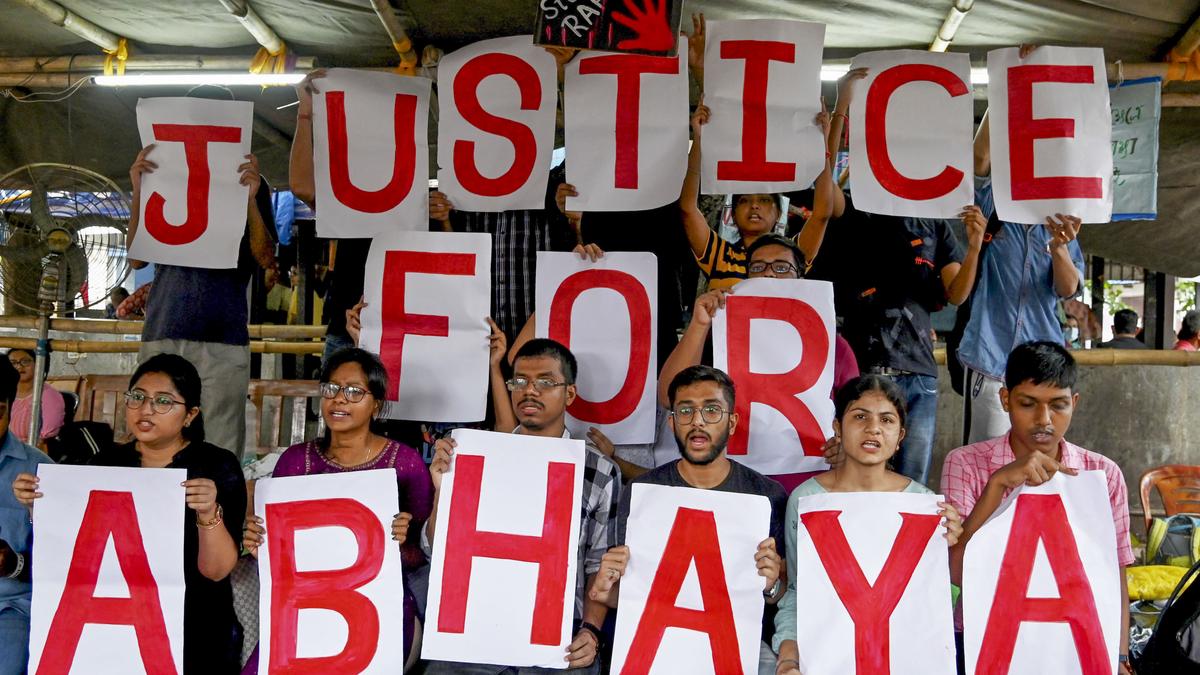“The nation cannot await a rape or murder for real changes on the ground.” – Supreme Court
By Lauren Prem
Talks on safety standards are always at its peak whenever the nation is shaken with a horrendous rape case. Gradually, the talk dies down until another brutal incident goes viral. This repetitive cycle needs to be put to an end and safety standards need to be practically enforced.
The Supreme Court bench comprising CJI DY Chandrachud and Justices Manoj Mishra and JB Pardiwala, on 20th August 2024, shed light on the recurrent safety issues faced by women in our country, during the Suo moto proceedings on the Kolkata doctor’s rape and murder case. The crime took place on 9th August 2024 and the talk on safety has spurred since then. However, Justice DY Chandrachud emphasizes on ensuring safety in actuality through national protocols.
The Supreme Court, via its order, sets up a National Task Force (NTF) in order to address the pressing need of safety at this juncture. The NTF consists of ten members possessing expertise in the medical field – Vice Admiral Arti Sarin, Director General, Medical Services (Navy), Dr D Nageshwar Reddy, Chairman and Managing Director, Asian Institute of Gastroenterology and AIG Hospitals, Hyderabad, Dr M Srinivas, Director of Delhi-AIIMS, Dr Pratima Murthy, Director, National Institute of Mental Health and Neurosciences (NIMHANS), Bengaluru, Dr Goverdhan Dutt Puri, Executive Director, AIIMS Jodhpur, Dr Saumitra Rawat, Chairperson, Institute of Surgical Gastroenterology, GI and HPB Onco-Surgery and Liver Transplantation and Member, Board of Management, Sir Ganga Ram Hospital, New Delhi, Professor Anita Saxena, Vice-Chancellor, Pandit B D Sharma Medical University, Rohtak, former Dean of Academics, Chief Cardio thoracic Centre and Head Cardiology Department AIIMS, Delhi, Dr Pallavi Saple, Dean, Grant Medical College and Sir JJ Group of Hospitals, Mumbai, and Dr Padma Srivastava, formerly Professor at the Department of Neurology, AIIMS Delhi.
Justice DY Chandrachud states that the NTF, in formulating an action plan must pay regard to two primary aspects – preventing gender-based violence against medical professionals and providing a national protocol to ensure safe working conditions for interns, residents, senior residents, doctors, nurses and all medical professionals.
A crucial measure put forth by the court is ‘triaging medical departments and places within the hospital’ based on the possibility of violence. It further states “Areas such as emergency rooms and intensive care units are prone to a greater degree of violence and may possibly need additional security in place to deal with any untoward incident.” This step ensures that safety measures are well-planned and implemented on a need basis, rather than adopting a generalised approach of safety that may not adequately address the issue at hand.
The court also presses the need for infrastructural development within the hospital premises that align with the goals of safety that this protocol aims to achieve. The court suggested separate resting rooms and duty rooms for male doctors, female doctors, male nurses and female nurses, installation of CCTV cameras at all entrance and exit points of the hospital and corridors leading up to the patient rooms.
The medical professionals for whom protection is given under this judgement encompasses “every medical professional” including doctors, other medical students undergoing compulsory rotating medical internships as a part of their MMBS course, resident doctors, senior resident doctors and nurses including those who are nursing interns. A broader interpretation is purposefully given to extend protection to all stakeholders.
The court rightly recognises the fact that laws and increased punishments are not sufficient to tackle the safety issues faced by female professionals. Rather, there must be execution of the ideals that are often merely laid down on paper.
Beyond providing guidelines for safety, the judgement touches upon important rights that form the bedrock of a democracy, although these rights are not explicitly provided under the Constitution. The court observes that the equality code enshrined in our constitution cannot be met if the safety of women is at stake.
With regard to the Kolkata rape and murder incident in particular, the court states “West Bengal should ensure that the power of the state is not unleashed on peaceful protestors.” Protests, when peaceful, uphold the right to freedom of speech and expression guaranteed under article 19(1)(a) of our Constitution. Protests reflect an unmet need or an unfulfilled promise. If allowed, protests can do no harm than nudge the concerned authorities to improve the status quo.
Apart from implementation of safety measures in the workplace, it must be ensured that peaceful protestors do not feel unsafe. The nature of a true democracy is often unveiled in the kind of rights it protects. A death of the most basic rights marks the death of a democracy!


